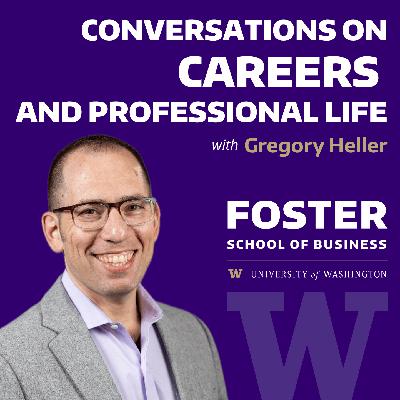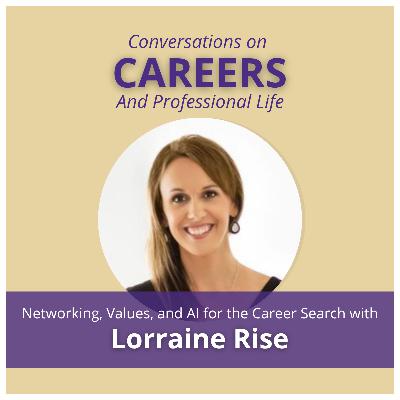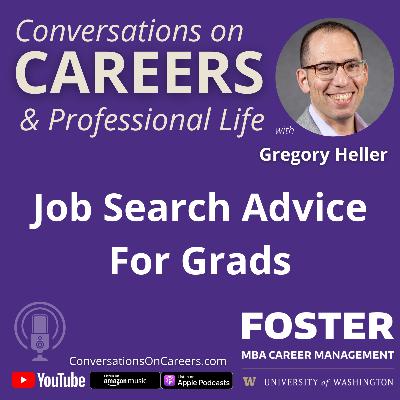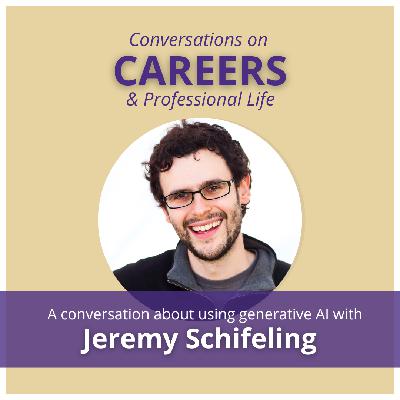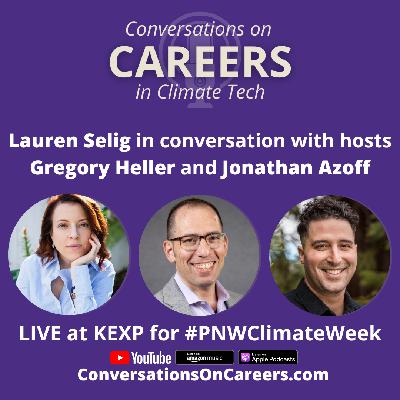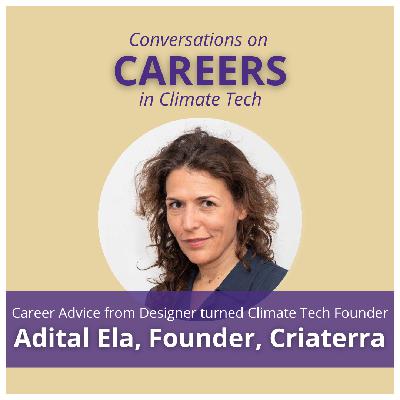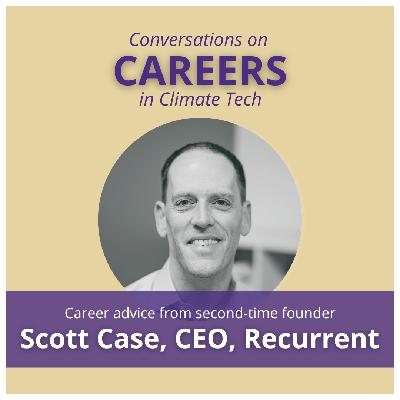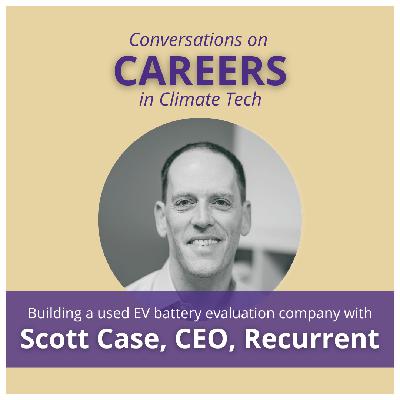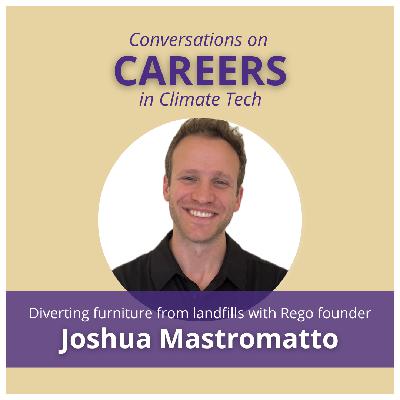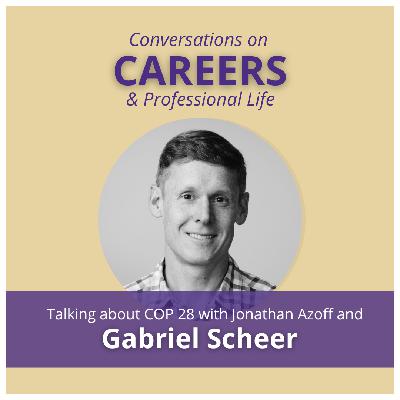Discover Conversations on Careers and Professional Life
Conversations on Careers and Professional Life

Conversations on Careers and Professional Life
Author: Gregory Heller
Subscribed: 27Played: 227Subscribe
Share
© UW Foster School of Business, MBA Career Management, Gregory Heller, All Rights Reserved
Description
Conversations on Careers and Professional Life, from the Foster School of Business office of MBA Career Management
Host Gregory Heller has conversations with University of Washington and Foster School faculty, staff, alumni, executives, current MBA candidates and other experts relating to career development, planning, and resilience. If you're navigating a career change, pursuing your MBA, or looking to develop a resilient mindset to help you with your job search, this podcast may be for you!
Host Gregory Heller has conversations with University of Washington and Foster School faculty, staff, alumni, executives, current MBA candidates and other experts relating to career development, planning, and resilience. If you're navigating a career change, pursuing your MBA, or looking to develop a resilient mindset to help you with your job search, this podcast may be for you!
98 Episodes
Reverse
Logos, Ethos, Pathos: The Ancient Keys to Modern Persuasion In this episode of Conversations on Communication, I explore three timeless principles that sit at the heart of all persuasive communication: Logos, Ethos, and Pathos. They come from Aristotle, but their power is as relevant today in an MBA classroom, a boardroom, or a client meeting as it was in ancient Athens. When you learn to apply these three deliberately, your messages become sharper, more credible, and more emotionally resonant. Logos: The Logic of Your Argument Logos is the appeal to logic — the structure and reasoning that makes your audience think, "Yes, that makes sense." It's not only about data; it's about connection. Logos ensures that every statement you make clearly links to the conclusion you want your audience to draw. Facts, analysis, and evidence give your message weight, but they need to form a coherent chain of reasoning. In business, Logos often appears through charts, models, and financial analysis. But data alone doesn't persuade — logic does. The strongest communicators make the relationship between evidence and recommendation unmistakable. "We recommend expanding into Austin because customer adoption is 25% higher and logistics costs are 30% lower than comparable markets." That single "because" captures the essence of Logos. A final note: too much data can obscure your message. Your job isn't to share everything you know; it's to make the most important facts impossible to ignore. Ethos: The Credibility of the Speaker Ethos is the appeal to credibility and character. It answers the question, "Why should I trust you?" Your Ethos comes from more than your credentials. It's built through tone, preparation, and consistency. It's how you show that you've done your homework, that you understand the audience's world, and that your insights come from care as well as competence. You build Ethos when you say, "We didn't have complete customer data for the past two quarters, so we supplemented it with qualitative interviews to strengthen our understanding." That blend of honesty and diligence communicates credibility. Ethos is also shaped by how you sound and carry yourself. A steady pace, deliberate pauses, and confident posture project competence. Silence, used well, communicates confidence. People decide whether to trust you long before they evaluate your argument — so make sure your delivery earns that trust. Pathos: The Emotion of Connection Pathos is the emotional appeal — the part of communication that makes people care. Logic makes people think, but emotion makes them act. Pathos doesn't mean manipulation; it means connecting your message to human values, hopes, or fears. It's about showing why your recommendation matters beyond the numbers. "This expansion could help 10,000 small businesses reach new customers and create jobs in underserved communities." The data might stay the same, but the emotional frame transforms how people receive it. Stories, metaphors, and anecdotes are natural vehicles for Pathos. Humans are wired for narrative — it's how we remember and share meaning. A story can make your data come alive, and it helps your audience see themselves in your message. People may forget your exact words, but they'll remember how you made them feel. Bringing It All Together The most persuasive communicators blend all three: Logos gives your message clarity and structure. Ethos builds credibility and trust. Pathos creates connection and motivation. Together, they form the foundation of influence. You can think of persuasion as an equation: Influence = (Evidence + Economics + Emotion) ÷ Context Your evidence is Logos. Economics speaks to both logic and motivation — the bridge between head and heart. Emotion is Pathos. And Context — the audience, timing, and tone — determines whether your message lands. Lead with logic. Reinforce with credibility. Connect with emotion. Key Takeaway Before your next big meeting or presentation, ask yourself: Is my argument logical? (Logos) Am I credible and authentic? (Ethos) Have I made my audience care? (Pathos) If you can answer yes to all three, you're not just informing — you're persuading. And that's the difference between being heard and being remembered. Resources Aristotle, Rhetoric Nancy Duarte, Resonate, Slide:ology, HBR Guide to Persuasive Presentations Scott Berinato, Good Charts Steve J. Martin, Influence At Work HBR: "The Science of Strong Business Writing," by Bill Birchard
In this episode of Conversations on Careers and Professional Life, I explire one of the most powerful frameworks for structuring clear, persuasive business communication: the Minto Pyramid Principle. The framework, created by Barbara Minto at McKinsey, is a simple but transformative way to organize ideas. Think of your communication as a pyramid: At the top is your main point — your recommendation, your answer, your "so what." Beneath that are the supporting arguments — the key reasons your audience should agree with or believe your main point. At the base are the evidence and details — the facts, data, and analysis that give those arguments weight. The beauty of the Pyramid Principle is that it works at every level. Your entire presentation can follow it, each section within your presentation can follow it, and even each individual slide can follow it. Every idea should ladder up neatly to the one above it. Why does this matter? Because most presentations and meetings fail not because the ideas are bad, but because the structure is confusing. When you cram multiple ideas into a single slide, include disconnected data, or bury the lead, your audience can't follow the story. If everything is important, nothing is important. The Pyramid Principle forces you to make choices. It asks: What's the single most important point I want my audience to remember if they leave after five minutes? That's the point that belongs at the top of the pyramid. Everything else exists to serve that idea—or it doesn't belong. Here's how to apply it. Start with your answer—your key recommendation. Imagine that the most senior person in the room gets a phone call and leaves six minutes into your presentation. If they walk out then, will they know what you're recommending? Don't make your audience wait until slide 17 to find out your point. Put it right up front. Then, support it with your major premises—ideally three. There's a reason consultants love the "rule of three." Research shows that once you go beyond three supporting points, credibility actually drops. Four or five reasons feel like overkill; three feels complete. For example: "We recommend launching the pilot in Austin—because customer adoption is highest, operational costs are lowest, and the competitive landscape is still open." That single sentence is a mini pyramid: a clear main point supported by three reasons. Each reason could then become a section, a slide, or even a paragraph of an email—each with its own evidence and analysis. Finally, check that every piece of content—every chart, bullet, and image—supports one of those reasons. If it doesn't, cut it. Anton Chekhov said, "If there's a gun on the wall in Act I, it must go off by Act III. If it's not going to be fired, take it down." The same is true for your slides: if it doesn't serve your main point, it shouldn't be there. Common pitfalls? Starting with background or methodology. You want to show your process, but your audience doesn't care how you got there until they know where you're going. Start with the destination. Overloading slides. Each slide should have one key message, and the title should say it, not label it. Instead of "Customer Survey Results," say, "Customers are willing to pay 20% more for faster delivery." Forgetting your audience. The Pyramid Principle works best when grounded in AIM—Audience, Intent, Message. Who are you talking to? What do they care about? What action do you want them to take? Before you build your next deck, don't start in PowerPoint. Start with a piece of paper. Write your main point at the top, your three strongest supporting arguments underneath, and then only the data or visuals that prove those points. When you've done that, you've built a story pyramid that's clear, concise, and persuasive. Remember—slides don't cost anything. Use as many as you need, but only one idea per slide. Start with the answer. Support it with logic. End with confidence. That's the Minto Pyramid Principle—and it's how you turn information into influence. Resources Mentioned Barbara Minto, The Pyramid Principle Nancy Duarte, Resonate and Slide:ology Scott Berinato, Good Charts HBR: "How to Give a Killer Presentation," by Chris Anderson
The AIM Framework: The Compass for Every Communication" Welcome to Conversations on Careers and Professional Life, on this series, I'm going to turn lessons from my MBA course, Professional Communication into practical insights you can use every day. I'm Gregory Heller, and today we're diving into one of the simplest—but most powerful—tools in communication, professional or otherwise: the AIM Framework, outlined by Lynn Russell and Mary Munter. AIM stands for Audience, Intent, and Message. It's a framework I teach in the very first session of my Professional Communication course, and it's one that I come back to again and again—because it works in every context: from team meetings to emails, from case competitions to C-suite presentations. Let's start with the "A"—Audience. Before you draft a slide, write an email, or step into a meeting, ask yourself: Who am I communicating with? What do they already know? What do they care about? What do they need to hear—not what do I need to say? As communicators, it's tempting to start with our own perspective: what we want to share, the details we think are important. But effective communication begins with empathy. When I teach this to my MBA students, I often remind them: if you're presenting to your project sponsor, that's one audience. But at your final presentation, you might have ten new people in the room—the sponsor's boss, colleagues, maybe other stakeholders. You need to know who those people are and what matters to them. At work, the same principle applies. A CFO and a Head of Marketing might look at the same data and see completely different stories. If you haven't thought about your audience, you're leaving understanding—and influence—up to chance. So before you even open PowerPoint or start writing, take five minutes to analyze your audience. Who are they? What's their level of expertise? What are they motivated by? And how do they prefer to receive information—visually, verbally, through numbers, through stories? That's the first step: know your audience. Next is "I"—Intent. Intent is your purpose. It's your North Star. What do you want your audience to do, say, or think after you communicate? It sounds simple, but this is where so many messages go off course. If you don't know your intent, you can't design your message. Do you want approval? Understanding? Action? Alignment? Think of intent as the destination for your message. You can't land the plane if you don't know where the runway is. When I talk with students about this, I often use an example: Imagine your boss calls you at 5:30 in the morning about a project problem. You're half-awake and you start talking before you've thought through what you want to say. That's when our thinking outruns our speaking—and that's when we say things we wish we hadn't. Intent brings focus. Before responding, pause. Take a breath. Ask yourself: What outcome am I trying to achieve here? The most confident communicators don't speak first—they think first. So that's step two: be intentional about your purpose. Finally, the "M"—Message. Only after you understand your audience and your intent can you craft the right message. Too often, we do this backwards. We start by writing the email, designing the slide deck, or outlining the talk—and then try to retrofit it to the audience. But when you've done the first two steps, your message becomes sharper and simpler. You know what to include—and, just as importantly, what to leave out. This is where clarity, concision, and structure come in. Every message should have a clear beginning, middle, and end. As I tell my students, "If you can't say what you're trying to say in one iPhone screen of text, it's probably too long." And remember the ABCs of communication: Active, Brief, and Clear. Active—use direct, strong language. Brief—say only what's necessary. Clear—make sure there's no ambiguity about your point. The message isn't just what you say, it's also how you say it: the tone, the channel, the timing, even the visuals you use to reinforce your point. Sometimes the best message is a phone call instead of a Slack message. Sometimes it's a short memo instead of a slide deck. The medium is part of the message. So that's the AIM framework: Audience, Intent, Message. It's deceptively simple—but that's its power. When you apply AIM before every important communication, you'll find that your writing becomes tighter, your presentations more persuasive, and your meetings more productive. You'll waste less time explaining and more time connecting. So next time you sit down to prepare a talk, an email, or a meeting agenda—stop and ask yourself three questions: Who am I talking to? Why am I talking to them? And what's the clearest way to get them to act? That's AIM in action—and it's the foundation of every great communicator.
On this episode, I talk about something that comes up all the time in my coaching sessions with MBA students—and that's networking. I've talked about it before on the podcast on episode 1202 "Reframe the way you think about networking and asking for help" I'll drop a link in the show notes. I encourage you to go back and give that one a listen. As generative AI has proliferated on both sides of the job search with candidates using it to submit more and more customized applications, and recruiters using it to filter through piles of hundreds or thousands of applicants, relationships are once again increasingly important in learning about opportunities before they are public, and securing interview invites. So many job seekers have what I call the hunter/gatherer mindset in their job search: they scour job boards for opportunities, and submit applications. I would encourage anyone in an active job search -- or anyone who thinks they might be in an active job search in the next 6 to 18 months, to adopt what I call the gardener mindset. Let's dig in. (no pun intended) If you're like many MBA students—or honestly, professionals at any stage—you may have a complicated relationship with networking. You know you're supposed to do it. You've heard it's important. But maybe it feels awkward. Transactional. A little sleezy even. I picture Christian Bale as Patrick Bateman in American Psycho with his heavy-bond embossed business card. Maybe you don't want to "bother" people. Or maybe you're waiting until you have a clear goal or ask before reaching out. I get it. That hesitation is totally normal. But here's the thing—networking is not a one-time transaction. It's not about reaching out only when you need something. It's not just about collecting contacts on linkedin like pokemon cards. Networking—effective, sustainable, authentic networking—is about building relationships over time. That's where the gardener mindset comes in. Imagine you're a gardener. You don't just toss seeds into the dirt one day and expect to harvest a salad the next. You prepare the soil. You plant a variety of seeds. You water them. You protect them from frost. You wait. You come back to check on them. Sometimes they sprout. Sometimes they don't. Different plants mature on different schedules. Some may require years before you are ready to harvest anything. The same is true for relationships in your professional life. When you meet someone at an event, or reach out for a coffee chat—you're planting a seed. Having that conversation is watering it. Following up with an authentic note is watering it. Another follow up after you took some advice they gave you… is watering it Sharing an article or podcast with them, or an update on your journey—that's watering it. When you refer someone else to them, or cheer on their LinkedIn update—that's tending the garden. You're not always sure which seeds will grow or when they'll bloom. But if you keep showing up, nurturing those relationships, you'll start to see the garden take shape. And here's the beautiful thing: relationships compound over time. Opportunities, referrals, mentorship—they often emerge from the people you've been in touch with for years, not just weeks. But you have to invest in those relationships before you "need" them. So how do you network like a gardener? It's like the old saying, when's the best time to plant a tree? 20 years ago. When's the second best time? Today. So Here are a few quick tips: Start early. Plant the seeds now. Just like a health garden will be diverse, you need a diverse strategy: reach out to current contacts, reconnect with old contacts, attend events to make new contacts. Be curious, not transactional. Ask questions about their path. Their decision points. What they've learned. I love Steve Dalton's TIARA framework for informational interviews, that stands for asking questions about Trends, Insights, Advice, Recommendations, and Assignments they are working on. Listen to my conversation with Steven, I'll drop a link in the show notes. Follow up thoughtfully. A quick note saying "Thanks again, I found your advice helpful" and specifically name what was helpful! A personal message -- it doesn't have to be long -- will go a long way. Give back when you can. Share an article. Introduce someone. Celebrate their wins. Ask them if there is anything you can do for them in return. That kind of reciprocity can build rapport. Track your outreach. Not to be mechanical—but to stay organized. Relationships grow with attention. Especially when you are in a more active phase of your search, develop a system for tracking your contacts. This can be as simple as a spreadsheet, or something more robust like a CRM. Networking isn't about having the perfect pitch--or heavy bond, embossed business card. It's about building trust, credibility, and rapport. It's about investing in people and communities over time—knowing that some of those relationships will blossom into opportunities in ways you can't predict right now. So as you move through your MBA, or any career transition, I invite you to think like a gardener. Be patient. Be intentional. Keep planting. Keep watering. And trust that the harvest will come.
On this episode, I speak with Lorraine Rise, career coach, founder and CEO of Career UpRising and host of the Career UpRising podcast. With a background in federal recruiting, Lorraine has spent a decade empowering mid- and late-career professionals through career pivots and values-driven job searches. We explore: Redefining Networking Learn how shifting from transactional outreach to authentic relationship-building can unlock access to the hidden job market—especially valuable for MBA students and early-career professionals. Values‑Driven Job Search Lorraine shares her framework for aligning job searches with personal values and company culture—essential for sustained career satisfaction and resilience. Smart Use of Generative AI in The Career Search and Preparation From using tools like Perplexity for in-depth employer research to leveraging AI-enabled editing tools (not full writing), Lorraine explains how to stay human and personalized in your job applications. 🗝️ Top Takeaways Cultivate Deep Networks Investing in meaningful relationships leads to job opportunities that don't appear on public platforms. Anchor Your Career in Purpose A values-aligned job search ensures long-term engagement and less burnout. Augment with AI, Don't Automate Use tools like Perplexity to research roles and AI editors to refine application materials—while preserving your unique voice 🔗 Resources & Links Career UpRising Podcast – Lorraine's podcast, and my appearance on her show. Career UpRising Website Lorraine on LinkedIn Perplexity AI
It's May, and for many of you, that means graduation. Whether you're finishing your MBA or completing another academic journey, this is a moment filled with possibility—and uncertainty. Especially in today's job market, it's natural to feel some anxiety about what comes next. To support you in your job search, I want to point you to a few episodes from the back catalog that offer practical tools and strategies to help you navigate this transition. First up: Steve Dalton, author of The 2-Hour Job Search. In our conversation, he breaks down a step-by-step approach to landing interviews efficiently—even in a tough market. If you're looking to up your LinkedIn game, check out my interview with Jeremy Schifeling, co-author of Linked: Conquer LinkedIn, Get Your Dream Job, Own Your Future. He shares insider tips from his time at LinkedIn and how to stand out online. Jeremy also returned to the podcast more recently to talk about how job seekers can use generative AI tools like ChatGPT to improve résumés, write better outreach messages, and streamline the job search. Along those lines, Ryan Dickerson, an executive career coach, joined me to discuss how AI can support career transitions, especially for experienced professionals looking to pivot or reenter the workforce. And finally, don't miss my conversation with Priyanka Natrajan, a Foster MBA who used the AI-powered platform Yoodli to practice for internship interviews. It's a great example of how technology can help you build confidence and polish your communication skills. You can find all these episodes at conversationsoncareers.com or by searching for Conversations on Careers and Professional Life in your favorite podcast app.
Episode Summary: Navigating Career Transitions with Ryan Dickerson In this episode of Conversations on Careers and Professional Life, I speak with Ryan Dickerson, founder of Good Fit Careers, about his innovative approach to career coaching. Ryan leverages generative AI tools like ChatGPT to help executives craft compelling resumes, prepare for interviews, and navigate career transitions. The conversation covers the importance of patience during job searches, building empathy for hiring managers, and the power of relational networking over transactional interactions. Ryan also shares his strategies for reframing career narratives to highlight problem-solving abilities and deliverables, rather than simply focusing on personal achievements. Additionally, the episode delves into how AI assists Ryan's coaching process, helping clients break down their professional journeys into actionable, digestible insights. Key Topics: AI-powered career coaching and resume optimization The value and importance of patience in career transitions Developing empathy for hiring managers Reframing career narratives Effective networking: Relational vs. transactional approaches Preparing for interviews by focusing on concrete outcomes Resources Mentioned: Good Fit Careers For Ryan's Coaching practice and podcast Follow Ryan on LinkedIn Tools: ChatGPT, Claude, Gemini, Perplexity.ai Listen to my conversation with Jeremy Schifeling, founder of the Job Search Insiders, about using AI in the career search. Networking guides: The 2-Hour Job Search and The 20-Minute Networking Meeting Listen to my conversations with Steve Dalton about the 2-Hour Job Search
In this episode of Conversations on Careers and Professional Life, I share some advice on reframing how you think about "networking" and asking for help. Move beyond the idea of collecting contacts Focus on building genuine relationships and learning from others Nurture connections over time for mutual benefit Understand that asking for help can actually benefit the person helping you Overcome the fear of being a burden when seeking assistance Strengthen relationships by showing trust and vulnerability Recognize that your network includes all communities you're part of Look for professional opportunities in unexpected places (e.g., school events, volunteer activities) "Real networking is about building relationships. It's about getting to know people, learning from them, and creating genuine connections." Action Steps for Listeners Reflect on recent interactions: What can you learn from someone you've met recently? What could you offer them? Practice asking for help: Reach out to someone in your network for assistance this week Map your communities: List all the different groups you're a part of and consider how they might connect to your professional life Check out out the books, Designing Your Life or Designing Your Work Life by Bill Burnet and Dave Evans, All You Have to Do is Ask by Wayne Baker, and Give and Take by Adam Grant.
Leveraging Generative AI in Your Career Search with Jeremy Schifeling Jeremy Schifeling, founder of The Job Insiders and author of Career Coach GPT and Linked: Conquer LinkedIn, Get Your Dream Job, Own Your Future shares his insights on how job seekers can leverage generative AI tools like ChatGPT in the job search process. Jeremy and I have known each other for seven years and recently co-presented a session at the Career Services Employer Alliance Global Conference on how graduate business school career services can leverage generative AI in their work. In this episode, Jeremy returns for a second conversation to discuss how business school students, job seekers, and professionals can use AI to tailor their resumes, cover letters, and interview prep, while staying authentic in their communication. Listen to my first conversation with Jeremy about his book, Linked, from May 2022. Key Takeaways: Get Hands-On with Generative AI: Jeremy emphasizes that AI tools like ChatGPT, Anthropic's Claude, Gemini and Copilot are easy to use, even for non-technical individuals. By interacting with these platforms, job seekers can quickly familiarize themselves with their capabilities—whether for refining resumes, helping to draft cover letters, or even brainstorming career paths based on personality tests like Myers-Briggs or CliftonStrengths. Crafting Effective Prompts: Jeremy and talk about the importance of specificity in AI prompts as well as using meta prompting techniques. While a generic prompt like "write a cover letter" might yield basic results, being more precise—such as asking for insights into missing keywords or requesting tailored interview questions based on a job description—will lead to better outcomes. He also encourages users to iteratively refine outputs, ensuring the final result feels authentic and personalized. Beyond Job Searching—Building Long-Term Skills: The skills you develop using generative AI tools can extend to developing AI literacy that is rapidly becoming a key asset in many industries. Understanding how to harness these tools for tasks like data analysis or marketing can make professionals more competitive in the long run. Practical AI Tools and Strategies: Role-Playing Interviews with ChatGPT: Use AI to simulate job interviews, ask follow-up questions, and even offer feedback on your responses, preparing you for tough, real-life interview scenarios. Mining Job Descriptions for Insights: Paste multiple job descriptions into AI tools to uncover common skills, which can help you craft a LinkedIn profile that resonates across different career paths. Maintaining Authenticity: While AI can help draft resumes and cover letters, Jeremy advises against over-reliance on AI-generated content. Ensuring your voice comes through is essential, as recruiters are becoming savvy to AI-generated applications. Craft prompts that include your first drafts, or career highlights, feed your final drafts back into the chat so the bot can learn from the changes you make. Resources Mentioned: ChatGPT Books by Jeremy Schifeling: Career Coach GPT Linked: Conquer LinkedIn, Get Your Dream Job, Own Your Future Ethan Mollick's book "Co-Intelligence: Living and Working with AI" Yoodli for interview preparation. Where to Find Jeremy Schifeling: Website: The Job Insiders (UW Foster MBA students get free lifetime access to Jeremy's Masterclass Library) LinkedIn: Jeremy Schifeling Listen Now and learn how to enhance your job search and career development with the power of generative AI! For more episodes and show notes, visit Conversations on Careers and Professional Life. If you enjoyed this episode, please consider leaving a rating or review on Apple Podcasts or your preferred platform! #JobSearchTips #AIinCareers #GenerativeAI #CareerDevelopment #MBACareers #LinkedInTips #AIForJobSearch #InterviewPrep #BusinessSchool
In this special live episode recorded as part of #PNWClimateWeek and the Bloomberg Green Festival at the KEXP Gathering Space, Gregory Heller and Jonathan Azoff sit down with Lauren Selig, a film producer, investor, entrepreneur, and board member of the XPRIZE Foundation. , Lauren shares her journey from journalism to film production and investment, highlighting the importance of intuition, mentorship, and environmental consciousness in her diverse career. Tune in to discover how Lauren's innovative projects are making a significant impact on climate tech and sustainability. Shake and Bake Productions XPRIZE Foundation Vaxxinity Colossal Pacific Northwest Climate Week, Climate Capitalism author Talk with Akshat Rathi and UW Foster Dean Frank Hodge Bloomberg Green Festival
In this episode we continue our conversation with Adital Ella, founder of Criaterra Earth Technologies. Adital shares valuable advice for those aspiring to enter the climate tech industry, drawing from her own experiences as an entrepreneur and innovator. Key points discussed: How to approach climate tech companies as a job seeker, even without a scientific background The importance of demonstrating genuine passion and alignment with a company's mission Strategies for growth within an organization, including starting in junior roles and working up Adital's personal journey from industrial design student to climate tech entrepreneur The value of following one's intuition and inner calling in career decisions Balancing innovation and business acumen in a growing climate tech company Adital's story provides a roadmap for those looking to make a meaningful impact in the fight against climate change. She emphasizes the importance of authenticity, collaboration, and personal growth in building a successful career in this rapidly evolving field. This episode offers invaluable insights for anyone considering a career shift into climate tech, as well as entrepreneurs looking to build and scale sustainable businesses. Adital's experiences highlight the unique challenges and rewards of working at the intersection of innovation, sustainability, and business. This episode is made possible in part with support from SNØCAP.vc.
In this episode, we talk with Adital Ella, founder of Criaterra Earth Technologies, an Israeli company pioneering sustainable, low carbob building materials. Adital shares her journey from sustainable furniture designer to climate tech entrepreneur, offering insights into the development of Criaterra's beautiful and sustainable tiles and building materials. Key points discussed: Criaterra's innovative building material, which sequesters carbon and reduces energy use by up to 82% compared to traditional manufacturing processes The importance of balancing environmental benefits with aesthetics and market appeal in sustainable product design Challenges and strategies for scaling a climate-focused building materials company Advice for aspiring climate tech entrepreneurs on navigating the business and investment landscape Adital's story highlights the potential for design-driven innovation in addressing climate change, demonstrating how creative thinking can lead to practical solutions for reducing the construction industry's carbon footprint. Whether you're interested in sustainable architecture, climate tech entrepreneurship, or the future of green building materials, this episode offers valuable insights into the intersection of design, sustainability, and business in the fight against climate change. This is part 1 of a 2-part conversation. In part 2, Adital offers more advice on pursuing a career in sustainability. This episode is made possible in part with support from SNØCAP.vc.
In the second part of the conversation, Scott Case, co-founder and CEO of Recurrent shares his career journey and lessons learned. Scott has worked at small companies, big companies, and started two companies himself. He shares some lessons learned at his first startup, EnergySavvy. Scott then offers advice for people looking to enter the clean technology or energy revolution space. He suggests that recent graduates should gain experience by working for a large company in the industry they want to decarbonize, learn about the processes, and then identify high-leverage ways to disrupt the industry through a startup. For those who prefer working at a startup right away, Scott recommends finding a small company where they can make a significant impact, learning about the company and how they can add value. He also shares the qualities he looks for when hiring, such as adaptability and a willingness to take on various roles. This episode is made possible in part with support from SNØCAP.vc.
Gregory Heller and Jonathan Azoff talk with Scott Case, the co-founder and CEO of Recurrent, a Seattle-based startup that offers independent evaluations of used electric vehicle batteries. Case discusses his journey as a second-time entrepreneur, having previously founded Energy Savvy, a company that helped energy utilities connect with customers for home energy efficiency upgrades. Case explains that Recurrent was founded in June 2020 to address the growing need for transparency in the used electric vehicle (EV) market. As more EVs enter the used car market, buyers are increasingly concerned about battery health and range. Recurrent's product aims to provide answers to these questions by analyzing data from connected EVs and comparing it to a large sample of similar vehicles. This episode is made possible in part with support from SNØCAP.vc.
In the second part of the conversation, Josh Mastromatto, co-founder of Rego, shares insights on how his experience as an athlete has shaped his approach to building a startup. He emphasizes the importance of focusing on what you can control, learning quickly, and surrounding yourself with people who can help you improve. Josh shares what he looks for an values when hiring. As a first-time founder, Josh's biggest learning curve was navigating the fundraising process, and he shares the importance of reaching out to experts, identifying patterns, and continuously acquiring knowledge through books and audiobooks tailored to the current stage of the business. This is part 2 of a conversation with Josh Mastromatto. Find part 1 in the podcast feed.
In this episode of "Conversations on Careers in Climate Tech," Gregory Heller and Jonathan Azoff are joined by Josh Mastromatto, co-founder of Rego, a startup addressing waste management in urban apartment buildings during move-out periods. Rego aims to reduce waste by diverting discarded items from landfills to more sustainable destinations where they can be reused. Part 1 of a this two part discussion covers the the inspiration behind the startup, the pivot from their original idea, fundraising and growth. Josh also shares the challenges of being a first-time founder and the support received from accelerators. The episode concludes with insights into Rego's potential growth and impact on sustainability in waste management.
Gregory Heller and co-host Jonathan Azoff continue their conversation with Steven Zhang, the founder of ClimateTechList.com, a comprehensive job site dedicated to climate technology roles for both technical and non-technical professionals. Gregory, Jonathan and Steven discuss strategies for job seekers aiming to enter the climate tech industry. They talk about Fred Wilson's "bits versus atoms" framework, emphasize systems thinking, and explore the sector's diverse roles. The conversation highlights the need for a systematic job search approach, the value of networking, and the importance of aligning personal values with career choices. They also discuss leveraging one's current position for environmental initiatives and provide resources for job seekers. The episode is a resourceful guide for those looking to make an impact in the climate tech space. Also mentioned in this conversation: WorkOnClimate.org Project Drawdown's Climate Solutions At Work / Every Job Is A Climate Job resources This is the second part of a two part conversation. This first part focuses on Steven's journey to creating ClimateTechList.com. You may want to listen to the first part before this. The Conversations on Careers in Climate Tech mini series is made possible in part with support from SNØCAP.vc.
On this episode first episode of the "Conversations on Careers in Climate Tech" mini series, Gregory Heller and co-host Jonathan Azoff speak with Steven Zhang, the founder of ClimateTechList.com, a comprehensive job site dedicated to climate technology roles for both technical and non-technical professionals. We explore what drove Steven to create the listing, the technology behind it, and how he orchestrated his own pivot to working in climate tech. Steven talks about the importance of networking and informational interviews to map out the industry landscape. We cover the complexities of the climate tech job market, where job titles aren't as standard is in more established industries. This is part 1 of a 2 part conversation. This first part focuses on Steven's journey to creating ClimateTechList.com. Part 2 includes more advice to jobs seekers. The Conversations on Careers in Climate Tech mini series is made possible in part with support from SNØCAP.vc.
In this episode I am joined by cohost Jonathan Azoff of SNØCAP, and we talk with Gabriel Scheer, Director of Innovation for Mobility and Energy at ElementalExcelerator. Recorded on December 12th, 2023, the conversation covers Gabriel's fresh insights from his first attendance at COP28, offering valuable perspectives for MBA students and professionals interested in climate innovation and sustainable careers.
Gregory Heller speaks with Jonathan Azoff, an experienced tech leader who transitioned into a mentor and investor role with a focus on sustainability. Jonathan is a GP at SNØCAP a VC firm that invests in early-stage, profit-oriented platforms that directly and indirectly solve the climate crisis. Jonathan's journey began with a strong interest in environmentalism and computing in high school, leading him to Silicon Valley. He worked in various tech companies like Disney, Zillow, and WeWork before moving into roles more aligned with his passion for sustainability, including involvement in a nonprofit focused on agriculture, food systems, and waste systems. Jonathan talks about the intersection of technology, sustainability, and business, emphasizing the importance of grit, luck, and a strong business foundation in successful ventures, especially in the evolving field of climate tech.


